WELCOME
Welcome to the first newsletter of 2019. We remain in a challenging and changing environment, with the results of the Augur Review expected this month, Brexit looming, recruitment competition ongoing, essay mills, unconditional offers and grade inflation all remaining high on government agendas.

It would be easy to be despondent but as a senior team we remain optimistic. We have concluded the Schools and Directorates strategic planning round, and are now looking at the shape of our estate and IT along with our people strategy to enable us to be in the best position possible to weather the turbulent times ahead.
Our students and their education remain our key focus, and the task and finish groups will be reporting back by Easter with changes made ready for the next academic year. Many of you are engaged in these and they are already reporting good discussions and ideas in the key areas under consideration. Our students need us to provide the best education and education environment that we can and this includes ensuring that we prepare them for working in a global market, whether based in Suffolk or much further beyond. Our interest in international partnerships remains high and we continue to seek partners who will enable us to meet our student needs in this area, whether through bringing international students on campus, providing study abroad/Erasmus opportunities and in the future research relationships. Our staff population enables us to bring a rich and diverse culture to our university and I am grateful to you all for sharing your expertise and experiences with our students and each other to enable us to learn from our differences.
This year marks the 25th anniversary of our provision in Early Childhood studies—something that we should all be proud of and use to demonstrate how we integrate with our community through using our expertise.
In December we ‘installed’ our first Chancellor— a fantastic way to round off 2018 as we continue to mature as a young institution. Dr Helen Pankhurst gave her time freely for staff through a lecture and with students through a visit to the SU. She plans to engage with us through the year, mainly at graduation ceremonies, at University Court and with a further lecture; alongside this she will actively champion the University wherever she finds herself in the UK and abroad, helping us to put the University of Suffolk on the world map as we grow our reputation and brand. Our strategic planning helped us to identify our key areas of distinctiveness and in turn this is helping us to drive the vision for our estate over the coming years. Watch this space as we seek to engage you in our thinking during 2019 and be willing to share your ideas to ensure we are challenged to deliver the best that we can for our future.
I wish you all a productive and peaceful 2019 and look forward to working with you in the months ahead.
Professor Helen Langton Vice-Chancellor
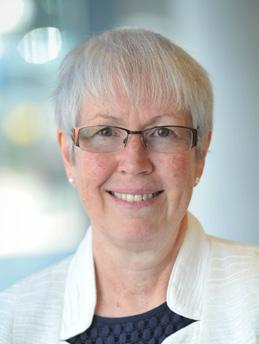
Issue 6 Winter 2019 page 1
University of Suffolk News
Dr Helen Pankhurst CBE officially installed as Chancellor
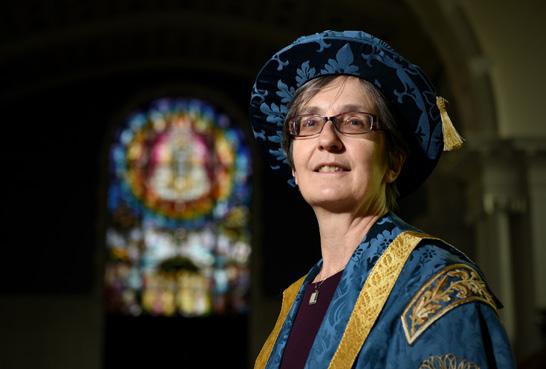
Graduation 2018
For the first time graduation was held on the Ipswich Waterfront.

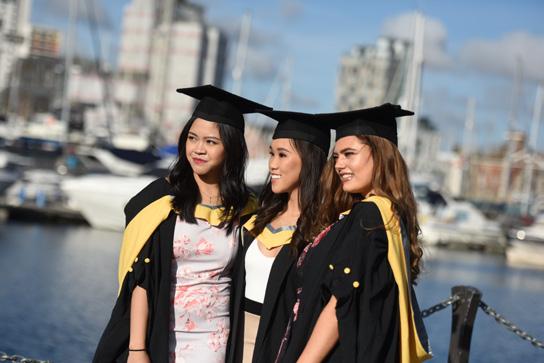
Over 1,400 students received their degrees in ceremonies that took place over three days.
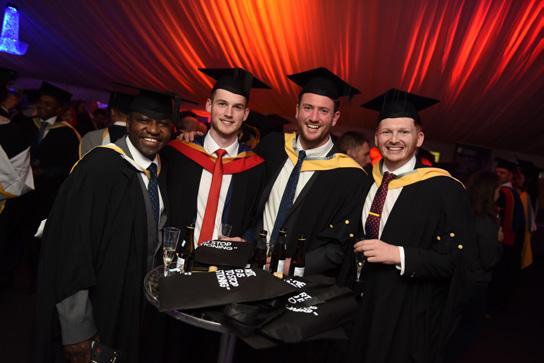
Visit our Flickr page for the Graduation photo gallery.
Dr Pankhurst CBE, who is a writer, academic, women’s right activist and senior adviser to CARE International, is the University’s first Chancellor. Dr Pankhurst is a trustee of ActionAid and a Visiting Professor at Manchester Metropolitan University. She is the great- granddaughter of Emmeline Pankhurst and granddaughter of Sylvia Pankhurst, leaders of the British suffragette movement. Her appointment as Chancellor came in the centenary year when some women gained the right to vote. Dr Pankhurst said, “The evening of the installation as first Chancellor was wonderful. It was about celebration, fun, people from the community and the University, friends all together. Fundamentally, it was about the beginning of something. What is important is what we do subsequently.”
Reflecting on the centenary year, Dr Pankhurst said, “Emmeline and Sylvia Pankhurst and all the other suffragettes and suffragist women would be saying ‘great for the celebration, there has been a lot of progress in so many areas socially, economically and politically’. They would also, I think without exception, be saying you are not there yet, there are so many issues that need to be addressed and don’t wait for others to resolve them. It is everyone’s responsibility to keep moving things forward.”
As is customary at installation ceremonies, the first duty of a new Chancellor is the conferment of an honorary award. This was presented to Suffolk based artist Charlotte Newson.
Charlotte Newson is a visual artist; her most notable piece of work is a photo-mosaic portrait of Emmeline Pankhurst, entitled Women Like You
page 2 IN FOCUS
Developing the University’s Area of Distinctiveness
By Professor Mohammad Dastbaz
Following Professor Helen Langton’s appointment as ViceChancellor, she has been in discussion with colleagues across the institution about the University of Suffolk’s distinct offers and how we can recognise and develop these as part of our strategic plan. The development of our four key strategies in the early autumn of 2018 and the newly introduced strategic planning round for Schools and Directorates has begun to give clarity on where we want to be in five years’ time in relation to our academic portfolio, our research and our business engagement. We have spent significant time looking at how we not only remain a comprehensive university, offering a wide range of courses, but also develop further in some areas where we believe we already are, could be or should be more distinctive.
While confirming our areas of distinctiveness (listed below), we need to be clear what will make an area distinctive. In our view these are:
A comprehensive portfolio of courses including undergraduate, postgraduate taught and postgraduate research
A comprehensive and joined up approach to relevant external stakeholders (industry, business, public sector, etc.)
Research to underpin our academic delivery and to have impact
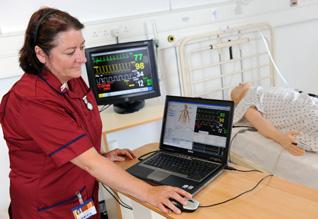
1. Health and Wellbeing
Given the broad range of undergraduate health and sports courses that the University currently runs and the fact that health and social care requirements will remain high on government agendas, it would be right for us to ensure that we capitalise on our existing growth and reputation in these areas, developing further in particular in new undergraduate health professional courses, in Postgraduate Taught degrees and in research.
The School of Health Sciences has identified two areas of distinctiveness that it wishes to develop, namely ‘Living well into old age’ and ‘Cancer Survivorship’.
The School of Science, Technology and Engineering already has a Sport Hub and a regenerative medicine community. We are also championing as a university mental health and wellness alongside dementia, both of which fit with living well into old age.
2. Creative and Digital Technologies
The Schools of Science, Technology and Engineering and Art, Design and Humanities both have the opportunity to contribute to developments in the area of digital technology. The School of Science, Technology and Engineering attempt to narrow the field to Artificial Intelligence (machine learning), data analytic science, future of connectivity networks/ internet of things and cyber security all under the umbrella of SMART. Art, Design and Humanities talks about a digital hub, largely in the context of portfolio. The external industry, in particular BT and others at Innovation Martlesham/Adastral Park are keen to see us grow and develop in this area.
3. Crime and Social Justice
The School of Law and Social Sciences has a number of areas of the academic portfolio (law, criminology, prison officer training, police training, etc.) that coalesce around crime and social justice. A number of colleagues are active researchers in these areas. In addition, the Suffolk Institute for Social and Economic Research undertakes a significant amount of work in this area. This is the key area for the University, where we already have some research substance, and if it is to increase we need to support its sustainability.
IN FOCUS page 3
continued on next page
4. History and Heritage
Our history provision enjoys excellent ratings nationally. Alongside the development of The Hold on our campus, with significant funding invested by the University of Suffolk as well as other founders, this context gives us a unique opportunity to make this an area of expertise. It is a niche area and is probably never going to grow to be significantly expansive; however various external bodies are already investing time with University of Suffolk to support our growth in this area. We have one Professor in the area already and when heritage is placed alongside Suffolk as a tourist destination it is apparent that this could be an area of distinctiveness albeit one that is very niche.
5. Sustainability
The New Anglia LEP sectors include energy referencing the regional expertise in oil and gas, nuclear and renewables, solar and micro generation alongside a globally competitive renewables support chain and support industry. The University of Suffolk has an interest in sustainability with the launch of the Suffolk Sustainability Institute.
However, the vision of this Institute is on wider sustainability beyond just the energy sector. We are also working with East Coast College with their new Energy Centre.
6. Pedagogy/Learning and Teaching
For the next year or two, our primary focus needs to be on our portfolio, learning and teaching, quality and enhancement alongside developing our curriculum to meet our new strategy. However, beyond achievements in this area we need to develop our research into pedagogy. In order to do this, we need to progress discussions with the Centre for Integrated Research across Educational Spaces (CIRES) and confirm the relationship between CIRES and the Centre of Excellence for Learning and Teaching (CELT), in a way that will enable us to drive our pedagogical research across the education sector, not just within higher education.
Expanding UK and International Partnership
The University has set up a significant long-term partnership with London School of Commerce (LSC), with undergraduate and taught postgraduate programmes validated for delivery at their campuses in London, Malta and Sri Lanka. There are also plans to extend the partnership to their campuses in Malaysia and Bangladesh in the 2019-20 academic year, subject to successful validation.
The LSC Group delivers a range of well-established business and management programmes at undergraduate, taught postgraduate and postgraduate research degree level. Since its establishment in 1998, the Group has expanded on a global scale, with campuses in Malta, Colombo, Kuala Lumpur, Dhaka and Jordan.
Other current LSC university partners include the University of Bedfordshire and the University of the West of Scotland.
The first cohort of Business Studies students started their courses in London in July 2018 and, following subsequent intakes in October 2018 and January 2019, our total student population in London has grown to over 1,500 students. Delivery is expected to commence in Malta and Sri Lanka shortly, under a 2+1 model with the students joining University of Suffolk validated programmes once they have successfully completed their first stage of study with LSC.
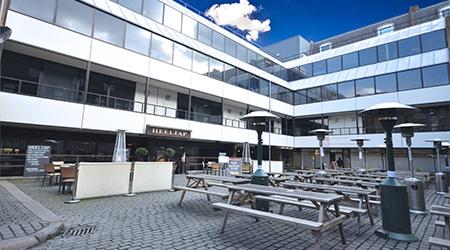
IN FOCUS page 4
continued
last page
LSC Chaucer house
from
Student experience
At the heart of everything we do is a consideration for the student experience. We are reminding students of this with a campaign, launching this month.
‘Transforming the student experience: you said, we did’ will highlight some of the ways the student voice is listened to and acted upon. Just some of the initiatives include:
The opening hours for the car parks have been extended to help students wishing to study later and for those attending evening lectures.
Technology has enhanced learning, for example, podcasts are being piloted to offer advice on assessment procedure.
Study skills support at the library has increased from 1,300 hours to over 7,000 hours.
Festival of Social
Science
We have a strategic plan to support students with mental health issues. As part of this over 60 staff members have completed the Adult Mental Health First Aid two-day course and nearly 50 staff have completed the Adult Mental Health First Aid half-day lite course.
£200,000 has been spent on implementing a new in-house online learning environment.
Hot refreshments and snacks are now available to students in the Library break-out area with the addition of two new vending machines.
Visit www.uos.ac.uk/yousaidwedid for more examples of how we are working to transform the student experience.
how the Economic and Social Research Council helped us to engage the public with research
By Andreea Tocca, Dr Olumide Adisa, and Katie Tyrrell
The University was selected to take part in this year’s Festival of Social Science, run by the Economic and Social Research Council (ESRC). Now in its sixteenth year, the Festival is the UK’s biggest celebration of social science. It runs nationally from 3-10 November and involves public debates, conferences, workshops, film screenings and virtual exhibitions.
The aim of the Festival is to highlight the impact of social science research on people’s lives and the University of Suffolk and we hosted two events for the public, in partnership with various organisations.
Public engagement describes the many ways in which higher education institutions and their staff and students can connect and share their work with the public. It generates mutual benefit, with all parties learning from each other through sharing knowledge, expertise and skills.
Our research makes a difference by transforming lives and for many years we have been working in close partnership with statutory and non-statutory organisations investigating ‘what works’ in different fields of enquiry related to social justice issues. We have successfully completed a number of high-profile commissioned studies in this area.
Research at the University of Suffolk seeks to change and have an impact on the real problems faced by our communities, businesses, people in Suffolk and further afield. In line with the new Research Strategy, we will continue to work in collaboration with many organisations and individuals to ensure our research is of use and powerful.
Our participation in this year’s Festival of Social Science enabled us to engage with the public on social science research and to showcase some of our work, and we are grateful to the ESRC for funding these events.
IN FOCUS page 5
continued on next page
continued from last page
Highlight from the ESRC-funded public engagement events:
Movement and Memories‑Exploring perceptions of Dementia focused on Dementia and the Arts. It was led by Andreea Tocca, Katie Tyrrell and Katrina Hedley, alongside Gecko Theatre Company.
Research has frequently highlighted the positive impact of artistic activities, including music, dance and poetry, upon the wellbeing and quality of life of people living with dementia.
The event enabled professionals, academics, students, carers and individuals living with dementia to come together to explore perceptions of dementia through dance and discussion.
Roger Fern of Ipswich Dementia Action Alliance presented an insightful analogy based on a bookcase model of memory storage, to explain the degenerative nature of dementia upon memory and how it may impact an individual.
At the heart of the event was a performance by the internationally acclaimed physical theatre company Gecko, drawing on the experiences of those living with dementia and carers. There were also talks from Orwell, East of England COOP, Suffolk Art Link, The New Wolsey Theatre, Sue Ryder and an inspirational talk from a younger person living with dementia.
Further talks from organisations, such as Suffolk Artlink and the New Wolsey Theatre, encouraged participation in artistic activities within the community, such as relaxed performances and forget-me-not performances within hospital and care settings for people living with dementia. The day finished with an exploration of the benefits of artistic interventions for people living with dementia led by Dr Sarah Housden, via an exercise challenging negative preconceptions of dementia and delving into the positivity and inclusivity associated with arts.
Highlight from the ESRC-funded public engagement events: The Approaches to Reducing Domestic Abuse conference discussed community-based approaches to tackling the issue. Findings and ongoing work from various research projects on domestic abuse were presented to highlight learning from local provision as well as sharing good practice.
The conference was jointly organised by Dr Olumide Adisa and Professor Nigel South from the University of Essex. Professor Emma Bond welcomed over 100 delegates to the conference and introduced the University of Suffolk to the public. Tim Passmore, Suffolk’s Police and Crime Commissioner opened the day by highlighting the link between domestic abuse and the issue of gangs in Suffolk.
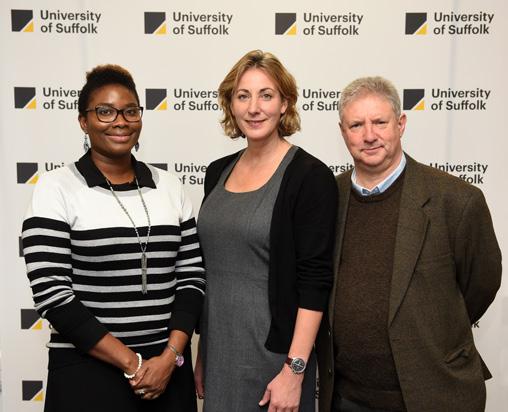
Other speakers included Alison Inman OBE from the Chartered Institute of Housing, Bonnie Navarra the Assistant Police and Crime Commissioner for South Wales, Dr Nicola Sharp-Jeffs, from Surviving Economic Abuse, and representatives from the Universities of Suffolk (Social Work), St Mary’s, Cambridge and Bristol. Practitioners from Suffolk and Norfolk also gave creative presentations on how they are tackling the issue.
Following on from the conference, we received fifty expressions of interests from practitioners, academics, and students to develop a Domestic Abuse Research Network in the region which Dr Adisa is spearheading.
page 6 IN FOCUS
Student art success
Final year BA (Hons) Fine Art student Renee Perreira has had a piece of her work purchased by The Priseman Seabrook Collections.
The Collections were established by British artist Robert Priseman and his wife Ally Seabrook in 2014 and are housed in north east Essex.
Morsel is a watercolour on paper by 32 year old Renee who lives in Ipswich. She said of the news, “I was surprised and elated discovering that Robert Priseman was interested in buying a piece of my work. Working predominantly in watercolours, I have been focusing on black female identity and issues surrounding black femininity within contemporary culture. Having my work included in The Priseman Seabrook Collection has been a crucial moment within my art career. I am close to completing my degree, so this has had a positive impact on my work for the upcoming degree show this year, and also for my future as an artist.”

Dr Lisa Wade, Dean of the School of Art, Design and Humanities, added, “We are absolutely delighted that Renee’s work has been purchased for the Priseman Seabrook collection. This is quite an exceptional achievement given that Priseman Seabrook is usually promoted through loan, public talks and similar; a purchase piece being rather more unusual. For Renee’s watercolor to be singled out by a collector at this early stage in her academic and professional career is testament to the professional environments promoted by staff and the broader studentship within our School.
Renee’s Morsel (below) will now sit alongside the works of internationally acclaimed artists within a collection dedicated to ‘21st Century British Works on Paper’; we all feel incredibly proud of her.”
Partnership with the University of South Queensland
Julie Macleod, Associate Professor, and Lee Cunnell, Course Leader for BSc (Hons) Paramedic Science from the School of Health Sciences, met with Associate Professor Jenny Kelly, Head of School Health and Wellbeing, University of Southern Queensland (USQ), Australia, to explore opportunities for collaborative working for the Paramedic Science programmes in the universities.
Working with USQ, which is also based in Ipswich, allows students the opportunity to exchange knowledge and gain an insight into programme delivery in another country.
As a result of the collaboration, Julie and Lee have been able to offer advice and support for the team at USQ for up and coming revalidation of their Paramedic Science programme and the team at USQ are able to reciprocate this for the re-approval of the Paramedic Science programme at the University of Suffolk next year.
In addition, an elective exchange programme is being developed to provide an opportunity for some current students to travel to Australia and experience a month long placement there, and we will welcome students from USQ to enable them to experience theory and practice in the UK.
page 7 NEWS AND UPDATES
Game Anglia
Once again the University hosted the popular Game Anglia conference and gaming event.
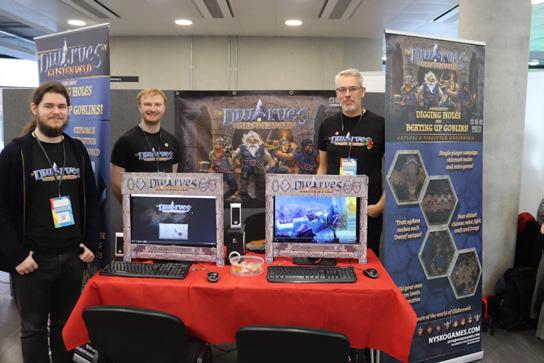
Developers, directors, artists, influencers, testers and community managers gave visitors a 360 degree view of the video game industry.
Industry legend Bill Roper led the speakers. He is known for his work on World of Warcraft and the Diablo series as well as being Vice President of Walt Disney Games, working on Disney Infinity amongst others.
Game Anglia was co-founded by University of Suffolk graduate Chris Fillip who said, “Having a game legend like Bill Roper in Ipswich was something we were very proud of achieving. Through this event we were able to inspire the hundreds of visitors.”
Associate Professor Rob Kurta added, “The Game Anglia line-up brought together industry veterans and social media celebrities in a fascinating day of talks. Together with an open indie showcase there was something for everyone. Game Anglia is run by Alumni and students on our Games degrees and this event is a clear demonstration of their entrepreneurial flair.”
Karen Williams
By Tim Greenacre
At the end of December Karen Williams retired as Director of Finance and Planning after 11 years at the University. Karen joined the University from the commercial sector in 2007 and has played a key role in the management of the institution’s finances throughout its development. In particular, her input to the business case which saw the institution achieve taught degree awarding powers and university title in 2016 was vital. Indeed, Karen regards the highlight of her time at the University to be the morning of 1 August 2016 as she drove into work listening to media coverage of the institution celebrating the first day of its independence. We wish Karen well in all her future endeavours, and hope she enjoys spending as much time as possible with her family in Portugal.
We also welcome Stuart Tinsley (below) who takes over from Karen as Director of Finance and Planning.
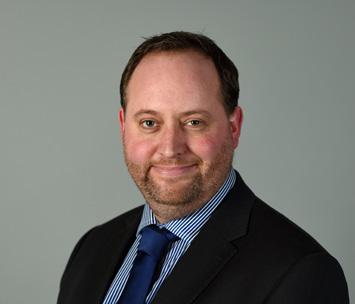
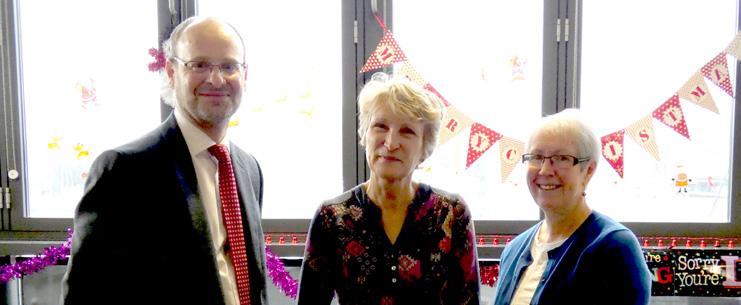
Stuart, who is a qualified accountant and holds a Masters in Mathematics from the University of Bath, joins us from a multi academy trust in Cambridgeshire where he spent several years as Director of Finance.

page 8 NEWS AND UPDATES
The start of the University’s first cohort of Nursing Associates
The School of Health Sciences has successfully secured a bid to work with a number of practice partners to develop the first cohort of Trainee Nursing Associates to study at the University. The School will be delivering the programme as part of the Health Education England pilot to introduce the role
into practice. The programme will be delivered through the Higher Apprenticeship Standard; students studying on the programme are based in a variety of practice areas including mental health, acute care and social care. The development will provide the opportunity to continue to work collaboratively
Key research into small charities
Suffolk based specialist business insurance broker, PolicyBee, commissioned the University to compile the Under the radar: risk management in small charities report.
It found that one in ten small charities ‘don’t have’ or ‘aren’t sure’ whether they have any risk management measures in place to ensure they achieve their objectives and safeguard their funds and assets. The majority (87%) only have one measure in place, leaving them ill-prepared to deal with risk and governance issues. Almost half (47%) of small charities are only partially confident in their capacity to identify and assess risk. And more than half (54%) feel less than fully confident when it comes to their ability to manage risk. These figures show a significant proportion are concerned that their organisations may be unable both to recognise a risk in the first place and deal with it, should problems arise.
64% of respondents from small charities cited a lack of time, followed by a lack of funds (52%) as the major barriers to putting risk management measures in place. Lack of expertise was also highlighted by 39%.
Six out of ten (62%) had never received risk and governance training—the biggest hurdles being lack of funding (57%), lack of time (50%) and not knowing where to access training (45%). The publication of the report has been welcomed by the sector and been widely written about in the media as well as being shared across various social media platforms.
PolicyBee are determined to support smaller charities and have created a Charity Help Hub, using some of the research findings to shape the free advice service.
Dr Olumide Adisa who carried out the research said, “To our knowledge, over 600 people have used the Hub so far. We are pleased that PolicyBee asked for our help in helping them better understand the risk management practices of smaller charities and how best to target their resources to support these charities.
“Despite the fact that the risks faced by charities depend on the size, funding, and services offered, the case of small charities deserves special consideration because these organisations are often performing essential front-line services in their local communities on shoestring budgets and many smaller charities are more likely to view risk management measures as a drain on resources.
with practice partners to grow and develop the programme. Trainee nursing associates will be studying towards the achievement of the Foundation Degree in Health and Wellbeing as well as completing placements in a number of areas across different fields of practice.
“Understanding how small charities identify, assess and mitigate risks can make a real difference to their longevity and sustainability as it highlights the extent to which different types of risk are dealt with in these organisations and the barriers that remain.
“This research has confirmed our suspicions that lack of funding and resources limit the ability of small charities to put suitable risk management measures in place, demonstrating an urgent need to bolster support around risk management for these organisations.”
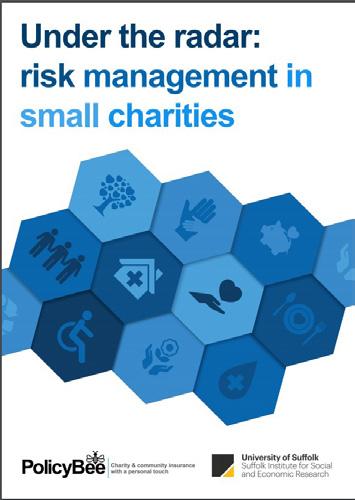
page 9 NEWS AND UPDATES
Early Childhood Studies Anniversary Celebrations
By Wendy Lecluyse
The academic year of 2018/19 marks the 25th year of Early Childhood Studies at the University of Suffolk. To mark this momentous occasion, the staff and students have been organising 25 events in celebration.
The events have already included several trips to the theatre, fundraising events such as cake and book sales and active engagement with children’s activities offered by the local Spill Festival of art on the Waterfront Marina, home to University of Suffolk.
Throughout the year, we will be supporting local and international organisations, engaging with Families in Need and hosting events supporting Period Poverty. We will be crafting squares with individual messages which we will join together to make a quilt, weaving togther present and past student and staff member’s stories of their time at the University and/ or depicting an important aspect of childhood. This
will be displayed in July when we host the final event, the Biennial International Children and Childhood Conference.
Alumni students who studied BA Early Childhood Studies, FdA Early Years Practice, BA Early Learning and BA Special Educational Needs and Disability Studies will be invited to contribute to the quilt and to mark the #25for25 event. We will also be hosting a celebratory drinks reception prior to the conference in the foyer of the Waterfront Building at 6.00pm on Monday 15 July where the publishing achievements of the Early Childhood Studies team will be on display.
Young carers share their experiences with nursing students
Pupils at Claydon High School have been sharing their experiences of being a young carer with nursing students at the University of Suffolk.

The young carers explained what their caring responsibilities are and the impact it has on their school life.
The aim of the event held at the University was to enable the nursing students to be better equipped to identify ‘hidden carers’ and to understand some of the challenges young carers can face.
Emma Murrow was one of the Child Health Nursing students to benefit. She said, “Meeting the young carers of Claydon High School has really enhanced our learning, it was nice to hear first-hand experiences and recognise how inspirational and resilient they are. Prior to the students arriving we had a session which focused on a negative perspective, however, the students surprised us with their positive spirits and motivation to still try to fulfil a normal childhood despite their responsibilities, this was lovely to see. Seeing this for myself and hearing the support the students receive from different services has enhanced my understanding of a young carers needs and how I can tailor the care I give to suit them.”
page 10 NEWS AND UPDATES
Winifred Lamb: Aegean Prehistorian and Museum Curator
Professor David Gill, Director of Heritage Futures at the University of Suffolk, has published a biography on Winifred Lamb, one of archaeology’s most prominent women.
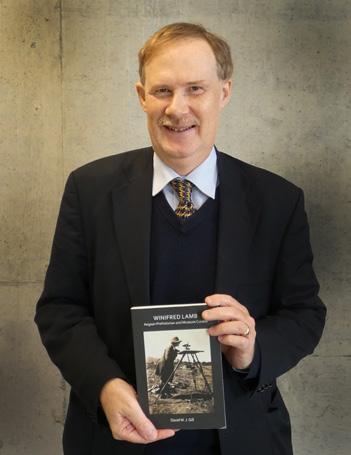
She studied classics at Newnham College, Cambridge, and subsequently served in naval intelligence alongside the Oxford archaeologist J. D. Beazley during the final stages of the First World War. As war drew to a close, Sydney Cockerell, Director of the Fitzwilliam Museum in Cambridge, invited Winifred Lamb to be the honorary keeper of Greek antiquities. Over the next 40 years she created a prehistoric gallery, marking the University’s contribution to excavations in the Aegean, and developed the museum’s holdings of classical bronzes and Athenian figuredecorated pottery.
After further work at Sparta and on prehistoric mounds in Macedonia, she identified and excavated a major Bronze Age site at Thermi on Lesbos. She conducted a brief excavation on Chios before directing a significant project at Kusura in Turkey. She was recruited for the Turkish language section of the BBC during the Second World War, and after the cessation of hostilities took an active part in the creation of the British Institute of Archaeology at Ankara.
The book documents the life of the pioneering archaeologist in Anatolia and the Aegean.
Winifred Lamb formed a parallel career excavating in the Aegean. She was admitted as a student of the British School at Athens in 1920 and served as assistant director on the Mycenae excavations under Alan Wace and Carl Blegen.
Research Community Seminar Series
The Seminar series aims to include previous, current or future research plans, methodologies and projects, assisting the exchange of opinions, ideas and collaborations.
The series welcomes discussions on research protocols, methods and ideas pertaining to research projects and their effectiveness. It also aims to provide the opportunity for challenging and debating existing research concepts. All students and tutors are welcome to participate bringing personal views and positions.
The first took place in December, where Dr Sarah Coombs led the session with a discussion of her research Magical spaces and where to find them: The inner deathscapes of young people.
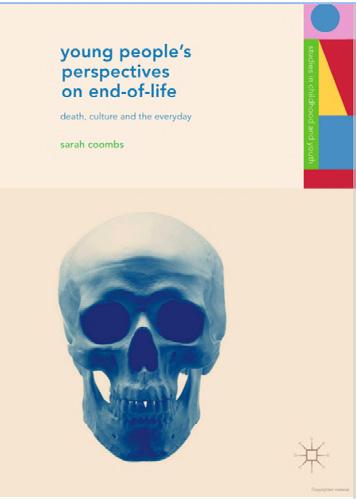
The term ‘deathscape’ is often used to convey the importance of physical space and place to humanities relationship with death. In the talk Sarah discussed the concept, to illuminate the ‘inner landscapes of death’ or ‘internal deathscapes’ of 29 young people, aged between 10 and 17 years, who talked to her about death as part of their everyday lives.
Professor David Gill said, “In the centenary since the end of the First World War, we remembered the contribution of women like Winifred Lamb who served in naval intelligence by helping to break enemy signal codes. Lamb’s legacy lives on in the classical displays of the Fitzwilliam Museum, as well as through the British institutes abroad that she supported.”
page 11 PUBLICATIONS
Digital Differences A conference to mark Safer Internet Day
Digital Differences brought together experts from across the country who addressed a regional audience of over 100 delegates from schools, colleges, healthcare providers, social services and safeguarding organisations.
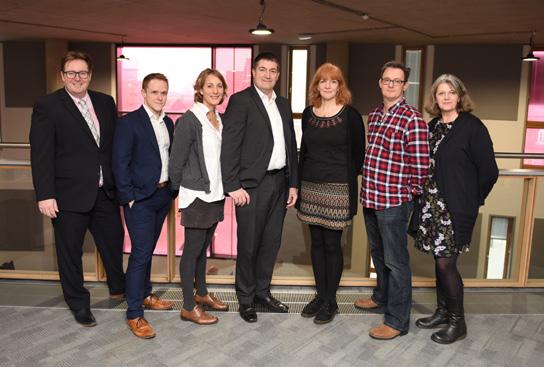
The University has been recognised as a pioneer in research, which addresses topical issues, particularly those affecting young people, such as peer-on-peer abuse, revenge pornography, sexual abuse online and cyber security. This work continued with the Digital Differences conference which addressed the question ‘A better internet for whom?’.
Professors Andy Phippen, from the University of Plymouth, delivered the keynote address. He is regarded as a national expert when it comes to social responsibility in IT and is a research partner with the UK Safer Internet Centre and a Member of the Parliamentary IT Committee.
Professor Phippen said, “It was a pleasure to provide the keynote for the second year running. Last year I thought we really started to move towards more progressive approaches to online safety and this year’s line-up was, once again, broad and diverse. The audience were asked to think differently about how young people, and adults, can be supported as they engage with online technology so they might do so in a resilient manner.”
Professor Emma Bond, Director of Research at the University of Suffolk and Katie Tyrrell, Research Associate, presented findings from their Digital Civility project, funded by the Office for Students.
Katie Tyrrell said, “The University is really proud to be leading the way in online safeguarding for students, our year long project clearly shows that students are entering university with diverse digital footprints that are often littered with adverse experiences, abusive content and sometimes indecent images. Our project has clearly demonstrated that by working in a holistic way across the student community we can mitigate the risks that students face.”
Quay to Growth Business Breakfasts
Several Quay to Growth Business Breakfasts are due to take place over the next couple of months.
The Series provides an opportunity to hear some unique insights into leadership, management, innovation and enterprise from academic staff across a variety of disciplines.
They also provide you with the opportunity to join our emergent enterprise network.
At each of our events there will be a presentation by a member of University of Suffolk academic staff, an opportunity for Q&A’s and business and HE enquiries, as well as informal networking.
To find out more, and to view our full events programme, please visit www.uos.ac.uk/events
OVER TO YOU
We want this newsletter to be a reflection of all of the excellent projects, research and work being undertaken by our staff.
If you have any feedback and suggestions for content please get in touch by emailing Atlanta Blair at atlanta.blair@uos.ac.uk Thank you.
page 12 EVENTS



















